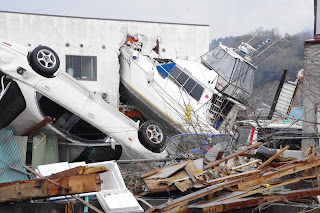It has been over one month since the 9.0 earthquake and tsunami struck Northern Japan
The need for aid is inspiring communities around the globe to come together to raise funds and send relief.
My dear old friend Naoko Dalla Valle proprietor of (Dalla Valle Vineyards) and a native of Kobe , Japan and Hiro Sone owner of restaurants Terra and Ame and a native of Miyagi Prefecture , Japan are both from the areas hit hard by earthquakes.
They have invited other Napa Valley chefs and vintners to join in raising funds for the Northern Japan Earthquake Relief Fund. It will be a dinner and auction at the Napa Valley Reserve on May 11, 2011.
Naoko, Hiro, The Napa Valley Reserve, Meadowood Napa Valley
Auction lots will include a magnum of 1997 Screaming Eagle, a double magnum of Harlan Estate 2007, a double magnum of Maya 1992 and BOND St. Eden 2005 double magnum plus a special trip to Japan. The serving wines include Harlan 2006, BOND Mulberry 2001, Maya 1994 and 2006 and Aubert Chardonnay and more. The Meadowood Napa Valley is kindly extending a 25% discount off their published rack rate for guests of the event.
I hope you will join them (and me if I can arrange my calendar) for a meal prepared collaboratively by Chefs Hiro Sone and Lissa Doumani of Terra and Ame Restaurants, Chef Richard Reddington of REDD, Chef Ken Tominaga of Go Fish and Hana, and Chef Christopher Kostow of The Restaurant at Meadowood. Wines for the evening have been donated by Dalla Valle Vineyards, BOND, Harlan Estate, Aubert and The Napa Valley Reserve. Fritz Hatton and Ursula Hermacinski will preside over the auction, which will feature a small collection of very special items.
All of the funds raised by this event will be donated to the Northern Japan Earthquake Relief Fund
through the Japanese Cultural and Community Center of Northern California, a 501(c)3 nonprofit organization.
Please contact JapanRelief@DallaValleVineyards.com or call (707) 944-2676 ext. 11 to be placed on the guest list. Dinner is limited to 100 guests. One thousand dollars per person.
The value of the dinner is $250 per person. 100% of the money raised will be donated to the Northern Japan Earthquake Relief Fund.
Naoko is an absolutely amazing human being. Those who are collaborating with her are equally also very special people. This is a rare chance to sit down with some of the top names in American winemaking and California cuisine, sample their incredible creative talents, and know that all the money is going to a great cause.























